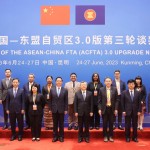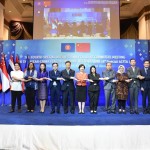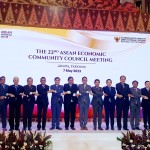Tổng số bài đăng 465.
 More than a month after the world’s largest trade pact came into force, questions remain over its practical application and potential benefits for small businesses, the e-commerce sector and workers.
More than a month after the world’s largest trade pact came into force, questions remain over its practical application and potential benefits for small businesses, the e-commerce sector and workers.
The Regional Comprehensive Economic Partnership (RCEP), comprising 15 countries – including China – and covering around 30 per cent of the world’s population and global gross domestic product, took effect for most members on January 1. South Korea was the latest country to formally join early this month.
The United Nations Conference on Trade and Development estimated in December that RCEP’s tariff reductions will boost intraregional trade by nearly 2 per cent, equivalent to about US$42 billion.
But despite the promise of huge payoffs, experts say the deal has clear limitations and a number of uncertainties remain.
The complexity of the trade framework has raised questions about how much small and medium-sized businesses can maximise its advantages.
“Companies will need to consider the RCEP offers carefully if they want to capitalise on the benefits fully,” said Wing Chu, business advisory head at the Hong Kong Trade Development Council.
Proving finished goods can meet RCEP’s “rules of origin” can be complicated, but the agreement provides companies with some flexibility in doing so, according to Singapore’s Asian Trade Centre.
“In the worst case, they will not be able to enjoy tariff concessions if their exports to RCEP [countries] do not meet the 40 per cent [regional value content] requirement,” Chu said.
Under the deal, businesses will technically be able to ship products across the region with more freedom. But Karishma Banga, a research fellow at the UK-based Institute of Development Studies, said for countries that already had bilateral free-trade agreements (FTA) in place, the benefits might be narrow.
“RCEP could have limited potential to improve market access in the Asean region given most countries in the RCEP agreement already have FTAs with other constituent nations,” said Banga, referring to the Association of Southeast Asian Nations.
Besides tariffs, another focus of RCEP is e-commerce development.
A joint study between Hong Kong Trade and Development Council and think tank ACCA China said the agreement aims to make it easier to sign online contracts and authorise electronic payments, while making it safer to make online transactions and improving access.
But many of the e-commerce rules lack teeth and are mere guidelines, according to analysts.
“If we talk about RCEP’s impact on e-commerce, there is in fact a broad exception on data flow that governments can do everything to limit it anyway,” said Deborah Elms, the executive director at the Asian Trade Centre.
RCEP’s digital commitments are weak because many elements like data and information protection are not included, she said.
Banga said the e-commerce chapter of the agreement is not legally enforceable. Rather, it is a set of best-effort endeavours for e-commerce that retains much-needed policy space for developing Asean economies. In terms of data flows, localisation and electronic trade, RCEP solidifies common positions.
The trade agreement has also been critiqued for lacking provisions to safeguard workers’ rights and the environment.
“It’s vital to protect against any negative knock-on effects for local food producers, small-scale and women entrepreneurs, pastoralists and other minority groups,” Amrita Saha, a research fellow at the Institute of Development Studies, wrote in a blog for the think tank in December 2020.
The rival Comprehensive and Progressive Agreement for Trans-Pacific Partnership (CPTPP), an 11-country Asia-Pacific trade deal, has stricter rules on digital markets, the environment, labour and state-owned enterprises.
Peter Petri, a non-resident senior fellow on foreign policy at John L. Thornton China Centre at the Brookings Institute, expects RCEP to expand its scope to cover these areas. He added that more RCEP countries may also join the CPTPP.
Zhang Zhiwei, president and chief economist at Pinpoint Asset Management, said the CPTPP “could be more important than RCEP as it requires further reform in the corporate sector”, while providing state-owned enterprises and private firms with equal treatment.
Source: SCMP












